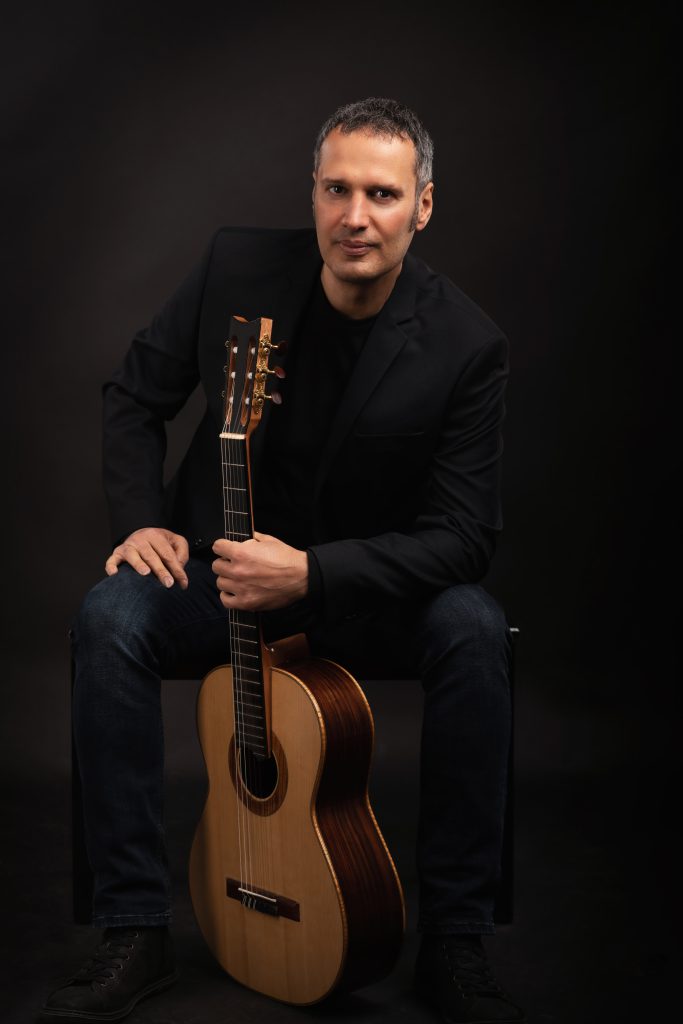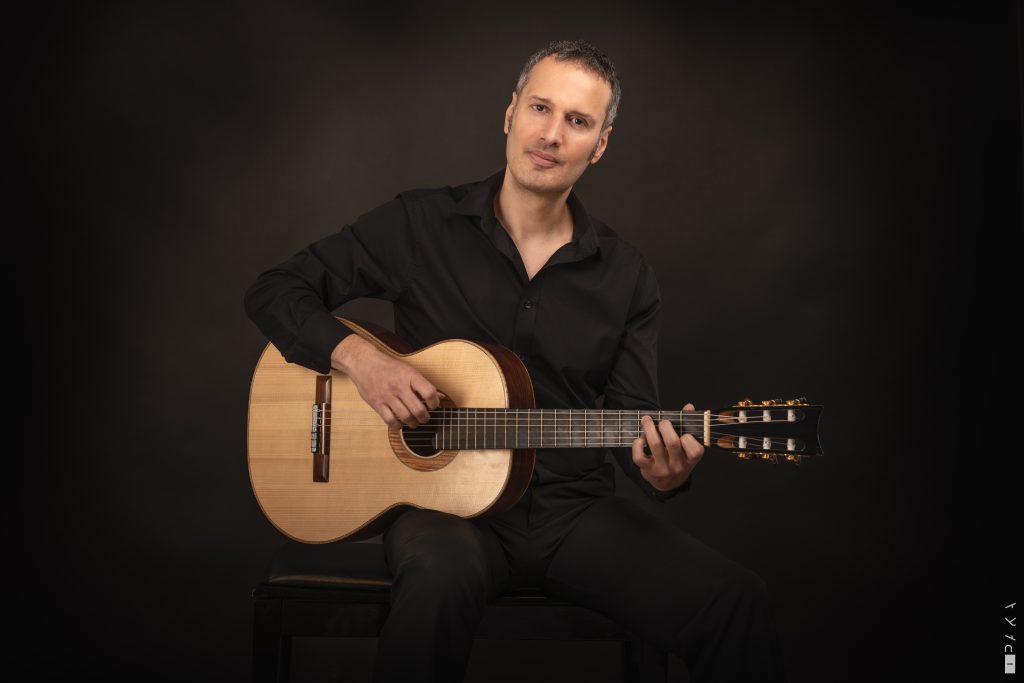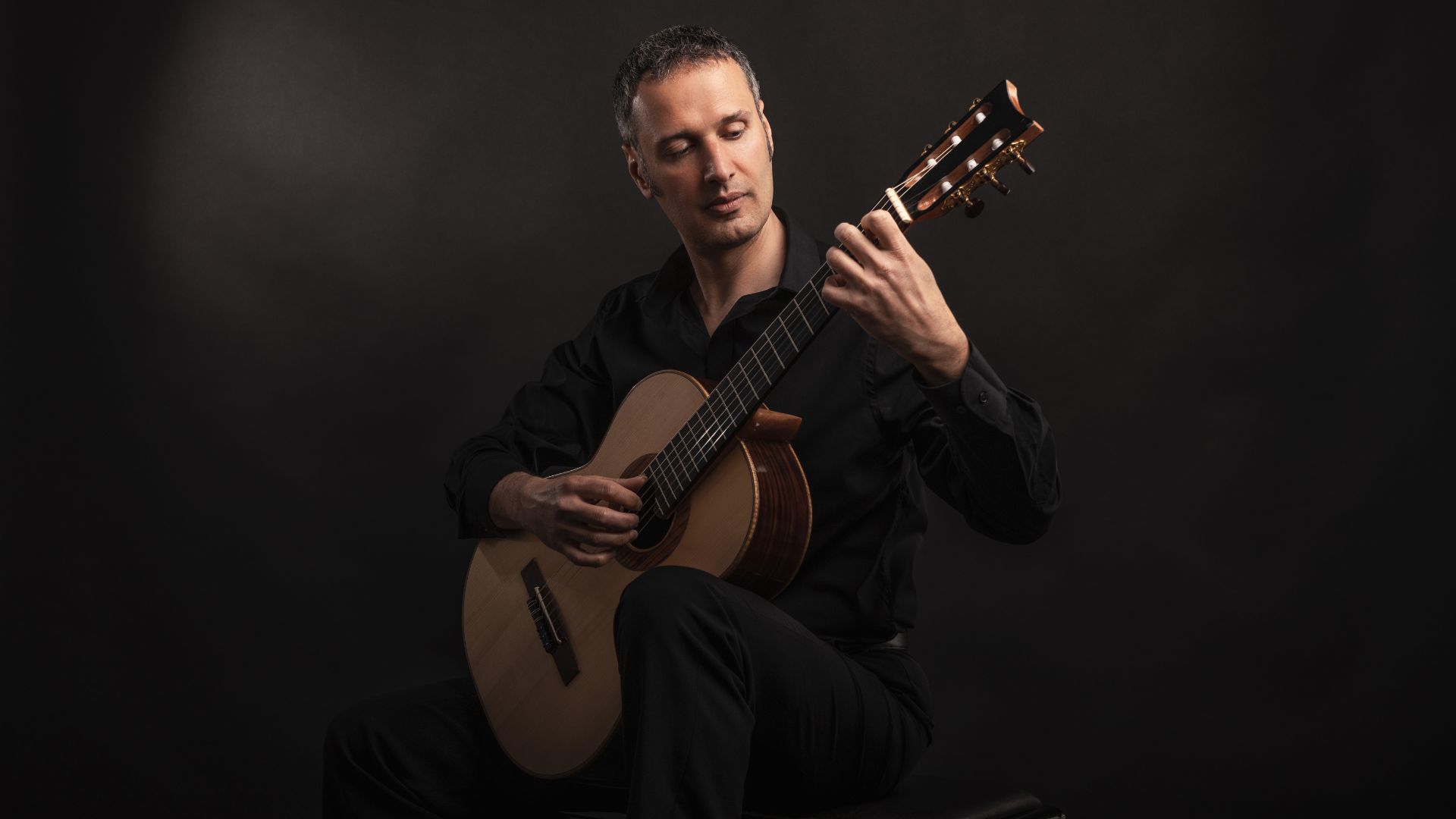By Nick Siriodis
When you read his biography, you can’t not be impressed. A multifaceted musical personality, a young man who has managed to work with musicians that others would simply dream of, Manolis Androulidakis boasts that he has achieved a lot so far in his career in music, but his dreams continue and he aims for more in the future.
He studied guitar, Musicology and composition at the Aristotle University of Thessaloniki. He taught for three years at the Department of Music Studies at the Aristotle University and one year at the Department of Folk and Traditional Music of the Technical Educational Institute of Εpirus.
As a composer, guitarist and conductor, he has collaborated with composers such as the one and only Mikis Theodorakis (among others he conducted the honorary concert for his 90 years at the Petra Theatre) and many more. Maria Dimitriadis, Manolis Mitsias, Eleni Vitali, Miltos Paschalidis, Giannis Kotsiras, Vasilis Lekkas, Rita Antonopoulou, Gerasimos Andreatos and many more have recorded his songs.

In the last three years, he returned more strongly to classical guitar, with original techniques and exceptional adaptations and compositions, resulting in the creation of important musical performances and recordings. In this context, he had the honour of working on Mikis Theodorakis’ official record collection, “Myrtia”, with works by the composer adapted for solo guitar. His resume is huge.
Manolis will be in Australia this year to take part in two performances for the Greek Festival of Sydney. He will be performing ‘Echoes of Freedom: A tribute to the songs of struggle’ at the Greek Community Club in Lakemba on Friday, March 15 from 7pm, and ‘Greek Music on Six Strings’ at the Sydney Conservatorium on Sunday, March 17 from 5pm.
Ahead of his performances, Manolis spoke to The Greek Herald about his music, his journey to Australia and what the community can expect from his presence.
How did you choose to play the classical guitar?
There was a guitar in the house and I felt as a child that I would play in the future. I listened to a recital by Evangelos Asimakopoulos when I was a primary school student in Rethymno, Crete. It’s a friendly instrument and I feel it as a continuation of myself.
How your studies influenced your profile as a musician and songwriter?
Everything we experience affects us. Studies, in particular, allow you to feel free in your choices. No technical issues concern you, and study and consistency open the horizons. Now, to a large extent, I operate with similar processes either by writing a symphonic work, or a zeibekiko. I try to create with all the “weapons” I have in my arsenal and the teaching of my teachers, Noti Mavroudi, Kostas Kotsiolis and Christos Samaras, is important.
We would like you to tell us about your collaboration with the great Mikis Theodorakis. Not many artists had that privilege.
I had participated several years ago as a conductor in the re-performance of the album “Ta Pikrosavvata” and I had conducted the concert at Petra Theatre to mark 90 years of Theodorakis’ contributions to music. So when I was offered (by Michalis Koumbios and Nikos Kourtis of FM Records) to work on a collection of Theodorakis’ work using the guitar, I accepted with joy feeling great honour. The eleven tracks of the collection “Myrtia” were prepared, recorded and released within a month, a sample of how the music of Theodorakis is a unique element of our Greek DNA, in me and in us.
What collaboration defined your career in the music scene?
All collaborations, more or less, define us as artists. I think that on stage, I was influenced by Maria Dimitriadis, in the studio by Giannis Spathas, in the creation of songs and seeing how they work by Christos Leontis and Dionysis Savvopoulos. You cannot fail to be influenced by collaborations with composers with greatness, humour and deep knowledge of music such as Mikis Theodorakis and Nikos Mamagakis – I spent many hours recording in his studio and he always insisted on making Greek coffee – and Leo Brouwer, with whom I had a brief but substantial acquaintance and stage collaboration thanks to my teacher, Kostas Kotsiolis.
The current era is considered good for Greek music.
Good things are done, but, in the end, music is projected, which, in my opinion, lacks inspiration, depth and sincere source intent. Trapp, neodemotics and imitations of American pop are unworthy of our conversation. In the rest of the Greek music landscape, young children with beautiful references to tradition have their audience and move away from the illusory television image.
Otherwise, I find, every day, that the cultural level is not high and that is why we do not have an identity, as we had in the 1960s, where there was an export of music, often of a folkloric character but also of a very high level from the great composers. Regurgitations, amateurisms, overly melodramatic performances by singers and record companies without knowledge, love and vision are addressed to an audience that finds it difficult to find somewhere to touch, having lost its sense bombarded with a plethora of mediocrity. All these are factors that deprive the “artful” song of freshness and source e.g. the 1990s.
As far as words are concerned, music is entrenched and I fear it appeals to fewer and fewer people. Few inspired composers, little support from the official state and only a few who have good relations with major institutions, are promoted. However, we do not lose our fighting spirit to raise the cultural level, because there is our hope for a better society.
How did you decide to come to Australia in March?
I wish I could come often, but that’s not always possible. Now, thanks to the warm invitation of Nia Karteris, it has become possible and my joy is great.
What can the Greek community expect to hear from you at the Greek Festival of Sydney?
I try to combine my two loves, the classical guitar and the Greek song, creating adaptations with completeness and technical requirements and what I will present, I hope to be able to give joy to the Greeks there. A performance with our most favourite songs are rendered with six chords and short stories, which I hope will end up with the listeners humming what they hear from the guitar.

What is next for you?
On record, I am in the process of composing and recording the CD “Talking to myself”, a collection of my compositions for two guitars (I play both on the recording). Already the first two, “Rondo” and “Baby born,” are released by FM Records. Also released is the album “Window to infinity” with my music, with lyrics by Alkis Alkaios and interpretation by Giannis Kotsiras from MINOS EMI. As for appearances, I am preparing an interesting performance on the F.G. Lorca for the Heptapyrgion Festival, with texts and art curation by Anna Mykoniou and direction by Athanasios Kolalas.
I continue my sporadic guitar-voice appearances with my good friends and collaborators Dimitris Basis, Pantelis Thalassinos, Kostas Thomaidis and Rita Antonopoulou, each separately in very interesting, I think, thematic programs. At the same time, I continue to write songs, works of music scholars and a book about my philosophy on the instrument.
Finally, a message you would like to send to the Greek community of Australia in view of your trip.
With a little anxiety and a lot of impatience, I can’t wait to get together.
You can book tickets to Manolis Androuliadakis March 17 concert here: https://bit.ly/greekmusic17032024. For more information on the programme and to book tickets to selected events, please visit www.greekfestivalofsydney.com.au

